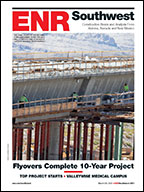Key Canadian Highway Expansion Delayed

A labor shortage, brutal weather and caribou have bogged down the $1-billion expansion and upgrade of a crucial highway in the Canadian province of Alberta, while public concern mounts over the frequency of deaths on that road.
The rash of recent deaths on Highway 63, including an April 27 crash that claimed seven, has sparked renewed government and industry pledges to expedite the 443-kilometer upgrade between Radway and Fort MacKay. In a region of remote areas and limited infrastructure, Highway 63 provides crucial access for equipment, supplies and labor to several refineries and mining sites in the now-famous oil-sands region, responsible for much of North America's crude output.
The Government of Alberta Ministry of Transportation committed $650 million in 2006 to expanding and upgrading Highway 63, but there are still hundreds of kilometers of construction to be done. The original completion date of 2013 has been pushed back to 2015. Mike Allen—a member of the Alberta Legislative Assembly, Fort McMurray, and recently appointed special adviser to Highway 63 construction by Alberta Premier Alison Redford—says that simply finding the labor power to support the massive mining and construction projects here, let alone the highway job, has been very difficult.
The April crash occurred on a 36-km stretch of Highway 63 under construction but was not caused by construction activity, Allen says. "There's been a lot of speeding and dangerous driving."
In addition, an environmental study on wildlife habitats took three years to complete. "The federal government contributed $150 million to this project with the stipulation that the province had to meet all environmental standards," Allen says. "There are five or six caribou management areas in the corridor, which meant we couldn't start construction in those areas until July 15. Our construction season is already short."
Indeed, the Alberta winter bites deep and it bites hard, says Will Gibson, a spokesman for Alberta-based miner and refiner Syncrude. He says the issues regarding Highway 63 have prompted the company to pursue its own transportation solutions. Syncrude depends heavily on Highway 63 for supplies, equipment and labor power. For several years, it has operated a shuttle program for workers in Fort McMurray who commute to Syncrude's Lake Mildred refinery to the north; the program has taken millions of drivers off the road and significantly lessened traffic. "We definitely want to see Highway 63 expanded as our own business grows and develops," Gibson says.
Nearly $1 billion in projects are either planned or under construction. The $19.3-million first phase of expanding a section of the two-lane highway to four lanes, including a timber-clearing and salvage effort between the Wandering River and the House River, is now under way, with Sigfusson Northern Ltd. serving as the general contractor. Phase two will include grading of the highway by Prairie Road Builders in a $17.6-million contract. The $48.8-million third phase of paving will be done by Ledcor Group.
Three bridges on Highway 63 in Fort McMurray are also under construction. Flatiron Constructors holds a $139.2-million contract to build the Athabasca River Bridge plus a $51.7-million Steinhauer Bridge reconstruction and six-laning project. Innovative Civil Constructors is building the $23.3-million Grant McEwan Bridge.
The Highway 63 section north of Fort McMurray to Lake Mildred has been twinned, but there are mining projects and development activities— operated by Suncor, Husky and other refiners—even farther north that need expanded highway access, says Ken Chapman, president of the Oil Sands Developers Group (OSDG), Edmonton. "Also, 80% of the estimated oil reserves is south of Fort McMurray, and those areas are experiencing heavy development," Chapman says.
OSDG is willing to help finance the expedition of Highway 63 construction in exchange for tax abatements or royalty forgiveness, says Chapman. "This should have been done years ago," he adds.


